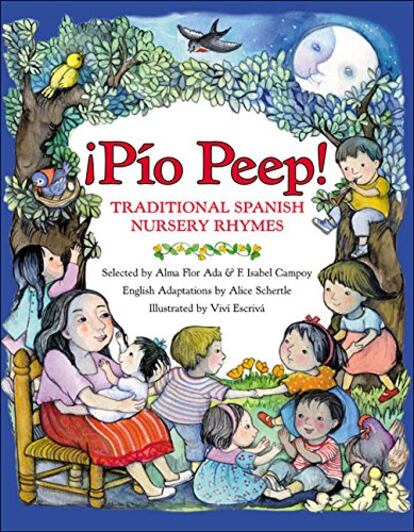Note to readers: EL PAÍS offers the Future Planet section for its daily and global information contribution on the 2030 Agenda. If you want to support our journalism,
subscribe here.
The concentration of minors found on either side of the border between Mexico and the United States is "a terrible problem," according to writer and educator Isabel Campoy. The Biden Administration has created a large economic fund, which is managed by the vice president, Kamala Harris, to curb migration at source, fighting "the serious problems that plague Mexico and Central America." But children continue to arrive who must go to school. In Spanish and English. And, according to Campoy, academic institutions lack "sufficient funds to meet such a need." "I have received a request from the directors of the Department of Bilingual Education at the University of San Diego to send books in Spanish," he says,"For programs that have been forced to improvise for minors on their border."
More information
Leaving adolescence behind towards the United States
Spanish, the second language of the United States and discriminated against
The great resignation of migrant children
Isabel Campoy (Alicante, 1946) can be considered the voice of the Spanish speakers of the United States. His are a good part of the textbooks with which both the natives who adopt it as a second language and the 55 million Latinos who do not want to forget their roots north of the Rio Grande study Spanish. They are also his several dozen bilingual children's and youth books in a literary career with which he has managed to get the North American Academy of the Spanish Language (ANLE), one of the 23 that make up the Association of Spanish Language Academies, has put his name and that of the co-author of the texts, the Cuban Alma Flor Ada, to an award dedicated to children's literature in Spanish.
It is not just an economic problem.
“Latino children, whether they have their parents or not, are admitted to public schools,” explains Campoy.
"The type of education given to them sometimes depends not only on the state in which they reside, but on the political-pedagogical orientation of its administrators," he says.
And most of the teachers "are white and supporters of monolingualism."
Cover of the book 'Pío Peep'.
The Alicante writer came to the United States in 1963, with a scholarship from the American Field Service. After developing her studies in English Philology to obtain a doctorate in Linguistics, in 1994 she was signed by the Houghton Mifflin Harcourt publishing house and moved to San Francisco, where she currently lives, with the task of creating elementary education books in Spanish for Latino immigrants, " since it was compulsory that they be taught until they learned English ”.
“The reality is that one in ten students in the American public school is an
English learner,” the
term that is identified in the United States for students who come to public school speaking a language other than English. "And although the majority are Spanish-speaking, the volume of students whose mother tongue is Arabic, Chinese or Vietnamese is also large." "Those students used to live in the border states, now they are all over the country," continues the writer, "their parents are
blue collar
, the workers who run the food chain, factories, fields and public services" . Cheap labor. And the United States can no longer do without these workers, or their children, says the pedagogue.
In the United States, Campoy came face to face with "the enormous contempt with which Hispanics, their language and their culture were treated."
“They said that Spanish is what the gardeners, the mechanics, the service personnel spoke,” he adds.
Also on the other side he found something similar.
"Latinos accepted this criticism and despised their language, to the point of abandoning it three years after settling there."
It was then proposed to exercise a kind of "cultural justice."
"A language that was spoken throughout the American continent one hundred years before the United States was constituted cannot be ignored," he argues.
The woman from Alicante is the author of 'Pío Peep', a bilingual book of children's lullabies that 23 years later is still being read and sold
The woman from Alicante discovered that migrant mothers "carried their culture on their shoulders when crossing the desert to cross the border." "They knew nursery rhymes, lullabies, sayings and traditional proverbs," he declares. And he began to build the second block of his literary career, that of children's books. “We started with the lullabies and the game songs. They were part of what traveled in the Spanish ships that set sail for America, with what constituted a common folklore in the 21 Spanish-speaking countries ”. This is how
Pío Peep was
born
, a bilingual book that is still being read and sold 23 years later.
Campoy's intention was always to favor the integration of migrants without forgetting their roots. "I was trying to show them that you are not more American because you forget Spanish, that you don't go further by mastering a single language, English, and that we are no less because we are Latino." A battle that, in his opinion, "is just beginning." "The American educational system has always wanted to destroy the right to study in two languages," he says, "but it is difficult to silence 55 million people." In the end, the solution for the preservation of this language in North American lands was in the system itself. "EE. The US is a capitalist country and the Spanish market is profitable ”.
The war against the Spanish is not frontal and it will never be.
Latinos are no longer just gardeners.
Even [Jeff] Bezos, the owner of Amazon, is of Spanish origin
"The Trump Administration tried to destroy the public school in favor of the private one," he says.
But even with the former Republican president in charge, Washington could "oppose teaching in Spanish, because Americans want to learn it."
“It is the language that is studied the most in universities and you cannot graduate without mastering a second language”, so “the war against Spanish is not frontal and it will never be, because Latinos are already everywhere.
We are no longer just gardeners.
We are at the top.
Even [Jeff] Bezos, the owner of Amazon, is of Spanish origin, ”he blurts out.
“I would like the second generation of Latino migrants not to switch to English so easily,” says Campoy, “but they arrive in such precarious social and economic conditions that they see no future in looking back and want to assimilate quickly to the citizens of the country. to which it has cost them so much to arrive ”. Not just at the basic levels. "The aid for the entrance of Latinos to the university exists, but the tortuous path to reach them makes many give up or not even try," says the writer. "It is also true that tenacity, dedication and interest in a goal have rewards here that would be unthinkable in other countries," he acknowledges. The hope for all these migrant students, according to Campoy, is the new Secretary of Education, Miguel Cardona. Puerto Rican, Spanish-speaking and
English learner
, Cardona can cement "an era of understanding and help that has been practically non-existent for decades," says the pedagogue.
FUTURE PLANET can follow on
,
and
, and subscribe
here
to our 'newsletter'
.








/cloudfront-eu-central-1.images.arcpublishing.com/prisa/ZH6GEEGTO7GQ27OPW2XP3TFYNI.jpg)